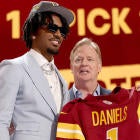The Redskins chapter in Kirk Cousins' NFL career should be coming to close with Washington's impending trade for Chiefs quarterback Alex Smith. The deal is expected to become official when the trading period re-opens on March 14, the first day of the 2018 league year.
The assumption was Cousins would be hitting the open market because of the trade. That was before a report that came out on Super Bowl Sunday about the Redskins considering a third-straight franchise tag for Cousins during the two-week designation period, which begins Feb. 20 and ends at 4 p.m. ET on March 6. Cousins' franchise tender would be $34,478,784, a 44 percent increase over the number he played for last season.
Shrewd or petty move?
Some would call restricting Cousins a shrewd move in which the Redskins would be trying to the use the tools at their disposal under the NFL's Collective Bargaining Agreement as a way to recoup some of the acquisition cost for Smith (Washington is giving up cornerback Kendall Fuller and a 2018 third-round pick). Others view it as a petty, vindictive action that could backfire on the Redskins.
Designating Cousins as a franchise player again wouldn't be uncharacteristic for Redskins president Bruce Allen. As Buccaneers general manager, Allen filed a grievance against Jake Plummer to recover $7 million of bonus payments previously made to the quarterback while with the Broncos because he chose to retire after Tampa Bay traded for his contractual rights in 2007. The parties reached a settlement where Plummer gave back $3.5 million despite never playing a down of football for the Buccaneers. A salary-cap credit equal to the money was also received.
Possible grievance
Another franchise tag would surely prompt the NFLPA to file an expedited grievance on Cousins' behalf demanding that he immediately become an unrestricted free agent due to the Redskins violating the NFL CBA, with Washington also suffering a loss of any compensatory draft choice because of him leaving. There is specific language in the CBA requiring a good-faith intention to negotiate with a tendered player or keep him for the upcoming season at his tender, which is almost $34.5 million in Cousins' case.
Cousins would seem to have a good chance at prevailing. The verbal agreement to acquire Smith undermines any claim the Redskins could make about Cousins being in their plans next season. There isn't a realistic scenario where the Redskins would want Cousins back with Smith on the roster. However, the exact same language that Cousins would be relying on was a part of the labor agreement in existence in 2009 when the Patriots put a franchise tag on quarterback Matt Cassel. It was obvious New England wasn't going to pay Cassel $14.651 million to be Tom Brady's backup after Brady recovered from the torn ACL that sidelined him for practically all of the 2008 season. The NFL allowed the Patriots to trade Cassel and linebacker Mike Vrabel to the Chiefs for a 2009 second-round pick (34th overall).
How it would work
Cousins' almost $34.5 million would count against Washington's salary cap as soon as he was designated as a franchise player. Unsigned franchise, transition and restricted free agent tenders are included under offseason cap accounting rules where only the top 51 cap numbers matter. It would remain as a Redskins cap obligation with an unsuccessful NFLPA challenge.
By rule, a third franchise tag would operate like the exclusive one Cousins received in 2017. He would be prevented from soliciting an offer sheet from other NFL teams.
It wouldn't be a surprise if the Redskins initially sought the two first-round picks that a team is required to give up for signing a non-exclusive franchise player to an offer sheet that isn't matched. The last time substantial compensation was exchanged for a franchise player was in 2008 with defensive end Jared Allen. The Chiefs received a first-round pick (15th overall) and two third-round picks in the 2008 draft from the Vikings. A swap of 2008 sixth-round picks was a part of the trade. The Vikings also signed Allen to a long-term contract, making him the NFL's highest-paid defensive player in the process.
Cousins' recourse
Cousins would still have some recourse if an arbitrator ruled against him. He couldn't be traded until he signed his tender, which would give him some control over the situation. Cousins would effectively have a no-trade clause since his cooperation would be required in order to be dealt to another team. The prospect of a team giving up significant draft-choice compensation or players is likely to be unappealing to Cousins because his new club would be weakened.
At the $178.1 million high end of 2018 salary cap projections, Washington is expected to have slightly under $50 million of cap space. With Cousins' almost $34.5 million tender potentially sitting on the Redskins cap for an indefinite period of time and $16,352,500 of space being lost because of the Smith trade, the Redskins would run the risk of being shut out of the first wave of free agency unless Smith's 2018 cap number was lowered with the four-year, $94 million extension he is receiving in conjunction with his acquisition, or other contracts were restructured.
High-stakes chicken
It could essentially become a high-stakes game of chicken where each side would be waiting for the other to blink. It's conceivable that Cousins would still have a chance to re-set the NFL pay scale if the Redskins rescinded his unsigned tender to free up the cap space, where he became a free agent under less than ideal circumstances when several teams that may have been interested in him have already addressed their quarterback needs. The Panthers revoking Josh Norman's franchise tag over a month into free agency as the 2016 draft was approaching didn't prevent him from becoming the NFL's highest-paid cornerback once he hit the open market.
There's been some speculation that the Redskins wouldn't be eligible for a compensatory pick by rescinding Cousins' franchise tender. The Panthers and Dolphins received 2017 draft-choice compensation after removing franchise and transition tags off Norman and defensive end Olivier Vernon in 2016.
Cousins quickly signing his tender, instead, could create a different set of headaches for the Redskins. He and/or his agent could discourage potential trade partners by telling teams there isn't any circumstance that he will sign long term if acquired because he is going to test free agency in 2019. Cousins' tender would become fully guaranteed when signed. To make matters worse, the Redskins would still be on the hook for the entire amount if he was released, regardless of how big of a deal he signed with another team.
Either approach would likely wreak havoc on Cousins' trade market. There may not be much of a demand anyway to pay Cousins top dollar while giving up anything substantial to get him. It's even harder to envision a team potentially renting Cousins for 16 games on the most expensive one-year deal in NFL history. He couldn't be franchised again in 2019. A transition tag at $41,374,541, a 20 percent raise over the third franchise tag, would be permissible. There would be only a right to match another team's offer sheet with a transition tag.
Summary
The Redskins going the franchise-tag route in an effort to gain more than the expected 2019 third-round compensatory pick for Cousins leaving in free agency may work better in theory than in practice. It seems like a risky proposition where too many things can potentially go wrong. If Cousins didn't win a grievance invalidating the franchise designation, he could still sabotage the trade process by being uncooperative. An unintended consequence of a third franchise tag could be that the agent community will become reluctant to have their free-agent clients sign with the Redskins when their offers are relatively equal to those of other teams because of Cousins' treatment. I know I would be making a mental note of the Cousins saga if I still represented players.





















